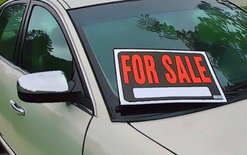2 Cheap makes strategic shifts

2 Cheap Cars has reassessed its car-buying strategy and plans to improve its direct-to-consumer digital channels after what it describes as a year of challenges and lessons.
The company outlined its priorities at its annual shareholders’ meeting on September 26 after revenue in the 2025 financial year fell six per cent to $82 million.
Michael Stiassny, chairman, says continuing recessionary economic conditions created a difficult operating environment that required the business to reassess its approach and become more agile.
He notes gross margin decreased from 24 per cent to 22 per cent in the last financial year, with the decline driven by pricing pressures and shifts in consumer behaviour that could not be fully offset.
Shareholders heard significant external cost increases have also impacted 2 Cheap Cars’ bottom line.
“The escalation of fees from third-party listing platforms has become a material drag on our profits,” explains Stiassny, pictured.
“In response we are now prioritising the improvement of our direct-to-consumer digital channels to reduce our reliance on expensive intermediaries.”
He continues that the company’s approach to buying cars has also changed as the impact of the clean car standard (CCS) on new and used imports in terms of the total cost of carbon credits is, and will continue to be, significant.
“2 Cheap Cars has responded by ensuring our Japanese procurement team is even more strongly focused on buying fuel-efficient and late-model cars that attract fewer carbon credit costs, to maintain optimal gross margins.
“And we are expanding our local vehicle acquisitions through trade-ins and wholesale channels to diversify our inventory and further reduce our exposure to the regulatory risks associated with carbon credits.
“These are not just tactical moves, they are strategic necessities to support the company’s long-term sustainability.”
Stiassny says the 2025 financial year was a reminder that profitability is not guaranteed even when the product meets market needs.
With continued economic headwinds in the current financial year, he explains the priorities are clear if 2 Cheap Cars is to protect and grow earnings and have a sustainable sales model that positions it for future success.
“We must continue to improve execution. That means identifying further operational efficiencies and ensuring our business is aligned with our strategic goals.
“Secondly, we need to reduce our reliance on high-cost, third-party platforms and invest in our own digital capabilities to build a scalable and sustainable sales engine.
“And finally, we must have a razor-sharp focus on safeguarding margins in what is an increasingly competitive and expensive environment.”
Market dynamics
Shareholders at the online meeting were told the cost-of-living crisis and persistently high interest rates significantly impacted the company’s customer base in the last financial year, while external costs to the business also continued to rise.
Angus Guerin, chief financial officer, says the fall in revenue during that period reflected industry-wide affordability pressures, lower sales volumes and retail pricing. Net profit after tax was $3.3m, down 47 per cent from the prior period’s $6.2m.
“We are adjusting our strategy to ensure we are managing costs and protecting margins as tightly as possible, in order to position the business to fully capitalise as market conditions improve,” he adds.
Despite market conditions remaining difficult, Guerin says there are a number of positive trends supporting the business.
First, reductions in the official cash rate are making car finance more accessible, with average finance sell rates down over three per cent in the past year, which materially reduces customer borrowing costs and improves affordability.
Second, the New Zealand dollar remains strong against the Japanese yen and is currently trading in the ¥86–¥88 range, which helps with vehicle acquisition costs.
Third, the company continues to experience strong volumes of private sellers supplying stock directly to dealers.
“While this source has not historically been a major part of the 2 Cheap Cars procurement strategy, it will play an increasingly important role to improve our resilience,” adds Guerin.
However, he went on to warn shareholders that the business also faces three key challenges.
These include the CCS, with carbon credit costs reaching $1.1m in the 2025 financial year and, despite a growing hybrid mix, those costs are set to exceed $2m in the current period.
Net migration has also slowed sharply and with immigrants a key consumer group for the business this has meant fewer new customers.
Finally, the cost of living continues to have an impact on the market as rising costs for essentials such as food, energy, housing and insurance are limiting discretionary spending across all sectors.
Focused strategy
2 Cheap Cars’ subsidiary in Japan, Car Plus, now employs seven specialist buyers and a dedicated logistics manager to bolster the supply of imported vehicles.
Guerin says the business has grown direct purchases from 25 per cent to more than 80 per cent over the past year.
To also help meet the challenges of the current market, he explains a greater focus on trade-ins and purchasing New Zealand vehicles will provide a competitive source of stock, complement its imports, increase flexibility across the network and assist in reducing carbon credit costs.
“For our retail footprint, we’re concentrating on high-traffic yards with maximum visibility and consolidating smaller underperforming sites to strengthen the network,” he adds.
“Our flagship dealerships in Greenlane and Sylvia Park are the blueprint for the future.”
The meeting heard the new sites are already proving their worth. The Greenlane dealership, which opened in march this year, has sold 242 cars, generated year-to-date revenue of $3.4m and has the highest per-car margin across the group.
Meanwhile, the Sylvia Park site opened on August 1 and in its first month of trading sold 136 cars and achieved $1.5m in revenue.
Digital shake-up
2 Cheap Cars has recently completed a rebuild of its website to improve its speed, usability and put the company in control of its digital future.
“With the rebuild, we’ve moved to best practice standards, creating a site that is much faster, more reliable, and delivers a seamless experience for our customers,” explains Guerin.
“Customers can now access vehicles, deals, finance, and dealership information in just a couple of clicks. “
“The new website … strengthens our brand, reduces reliance on third-party platforms and drives more traffic directly to 2 Cheap Cars.”
Year-to-date performance
2 Cheap Cars sold 3,058 vehicles in the five months to August 31, down 12 per cent on the prior year.
Revenue also declined five per cent in the financial year-to-date to $33.4m, “reflecting lower sales volumes, partially offset by improved retail prices and stronger finance and insurance penetration”.
Guerin notes finance penetration over the same period rose to 31 per cent, up four percentage points, and average insurance penetration reached 40 per cent.
“These gains reflect both the benefit of lower interest rates and the strong efforts of our sales staff,” he says.
“Gross margin eased by two percentage points to 19 per cent, primarily due to the carbon tax impact. Net profit after tax was $800,000, down $700,000 on the prior year. Again, it is important to note that the carbon tax contributed $500,000 to this decline.”





